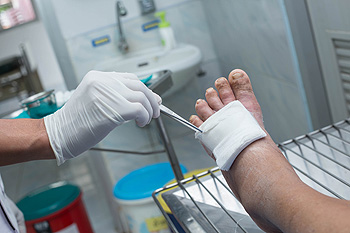

Treating a diabetic foot wound requires careful medical attention to prevent complications and promote healing. A podiatrist starts by cleaning the wound gently with mild soap and water to remove any debris. An antibiotic ointment can then be applied to prevent infection and covered with a sterile bandage. It is important to regularly inspect the wound for signs of infection, such as increased redness or swelling. Managing blood sugar levels is essential, as high glucose can hinder the healing process. Additionally, protect the wound from pressure and friction by using appropriate footwear. Elevating the foot and keeping it dry can also aid in healing. If the wound shows signs of infection or does not improve, seek medical attention promptly from a podiatrist. If you have diabetes and have developed a foot wound, it is strongly suggested that you are under the care of this type of doctor who can treat the wound, and help you to manage this condition.
Wound care is an important part in dealing with diabetes. If you have diabetes and a foot wound or would like more information about wound care for diabetics, consult with Massimo Pietrantoni, DPM from Rochester Podiatry, LLP. Our doctor will assess your condition and provide you with quality foot and ankle treatment.
What Is Wound Care?
Wound care is the practice of taking proper care of a wound. This can range from the smallest to the largest of wounds. While everyone can benefit from proper wound care, it is much more important for diabetics. Diabetics often suffer from poor blood circulation which causes wounds to heal much slower than they would in a non-diabetic.
What Is the Importance of Wound Care?
While it may not seem apparent with small ulcers on the foot, for diabetics, any size ulcer can become infected. Diabetics often also suffer from neuropathy, or nerve loss. This means they might not even feel when they have an ulcer on their foot. If the wound becomes severely infected, amputation may be necessary. Therefore, it is of the upmost importance to properly care for any and all foot wounds.
How to Care for Wounds
The best way to care for foot wounds is to prevent them. For diabetics, this means daily inspections of the feet for any signs of abnormalities or ulcers. It is also recommended to see a podiatrist several times a year for a foot inspection. If you do have an ulcer, run the wound under water to clear dirt from the wound; then apply antibiotic ointment to the wound and cover with a bandage. Bandages should be changed daily and keeping pressure off the wound is smart. It is advised to see a podiatrist, who can keep an eye on it.
If you have any questions, please feel free to contact one of our offices located in Brighton and Greece of Rochester, NY . We offer the newest diagnostic and treatment technologies for all your foot care needs.